|
Me and My Funder: Nutmeg and the Broads Authority
Meg Amsden of Nutmeg Puppet Company writes about her partnership with the Broads Authority which led her from the Norfolk and Suffolk Broads to the Danube Delta.
In turn, Rachael Miller from the BA explains what appeals to them about Nutmeg's work.
Meg Amsden writes:
I started working in the Broads in 1985. The Broads are one of Britain's finest wetlands. Lying in the valleys of five meandering rivers, this is a landscape of marshes, fens and swampy woodland, together with scattered villages and small towns. There is a huge variety of wildlife habitats. The Broads Authority had just been set up and were looking for unusual ways of informing the general public about the region. The then Chief Executive, Aitken Clark, firmly believed, as I do, in the power of the arts to educate and inspire.
My company, Nutmeg, were working on the beach in Southwold in 1984, doing a show about a pirate, a mermaid, some rubbish, and the ‘last herring left alive in the North Sea’, to large family audiences. Diana Shipp from the Broads Authority came to check us out, and that was the start of a long and fruitful relationship.
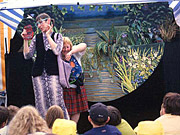
The Return of the Copper Flyer
|
At the beginning, the BA paid for my colleague, Nico Brown, and me to perform eight shows one week in August. Nico wrote a script about an unscrupulous holiday developer introducing crocodiles into the Broads, and the effects this had on local wild-life and people. The shows were popular, but as the audience was asked to pay a small fee, parents would only pay for their children to watch and then sat at a distance. We noticed that they were just close enough to hear and avidly watched the show all the way through. When a second tour was arranged, we suggested asking for voluntary donations instead. Audience figures doubled, and at least as much money came in. This has been our formula ever since.
The second year we worked for the BA we toured a show on a more general environmental theme - the loss of contact between contemporary children and the wild. The audience liked the show but the BA wanted something more closely related to the Broads. We were happy to do this but only if they would commission us properly and pay for the show to be made. Before this, we had only been paid for performances. Fortunately this coincided with their expansion and a big increase of funding. Since 1987 we have worked closely with them on the subject matter, consulting with their conservation and navigation officers.
Working together
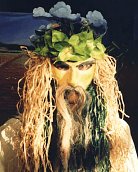
The Menace of the Mud Monster
|
In a typical year, I start working on a show after Christmas, discussing possible subjects with my main contact at the BA , currently Events Ranger Rachael Miller. Some years the BA has a particular topic they are promoting. For example the Barton project, which aimed to clear the metres deep layer of mud from the bottom of the Broad and improve the water quality, wild-life, and recreational facilities, inspired our show The Menace of the Mud Monster (1996).
In 1999, a very rare waterplant (Chara intermedia) invaded Hickling Broad, causing an acrimonious debate between sailors, fisherman, electric-boat-hire companies and conservationists. The waterplant is a protected species. It is very special to have it in the Broads, but in some years, it grows to the extent that it prevents the sailing clubs from sailing. Tempers were very high. The BA were at the center of the argument, and anxious not to inflame the disputes any further by letting us make the plant the subject of our show. In the end they relented. It was just too topical a subject to be avoided, but very sensitive. I was therefore careful to talk to people representing as many different sides of the debate as possible in my research for the show.
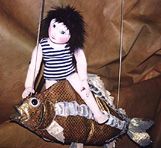
The Blooming Weed
|
By the time The Blooming Weed went on tour in August 2000, the plant was no longer such a critical problem, but we had some good discussions with audiences around the Hickling area about what could or should be done in future.
Last year we were asked to make a show about the effects of climate change on a wetland, to fit in with an international conference they were hosting on the subject. Entitled Heatwave, the show turned out to be only too topical as Europe sweltered in relentless heat.
Rachael Miller, Events Ranger with the Broads Authority who has worked with Nutmeg for the past five years, comments: “Meg’s shows work on many levels, and they have great importance for us ecologically, socially and economically. Our remit as a National Park includes promoting the enjoyment and understanding of the area, involving local communities in the Broads, and promoting the local economy, which is based around tourism. Meg’s shows can present complex ecological problems in an informative and imaginative way, and can show the public how the Broads Authority is working, which they might not see otherwise. But the shows can also explain to people what the compromises are when conflicts arise between the different interests. Compromises have to be reached. This year’s show, The Rubbish Monster about not dropping litter, made a very dry subject into something exciting and fun, and showed the complex ecological issues behind pollution.” In case we have given the impression that our relationship is always cosy and comfortable, over the twenty years of our working together there have also been some deep troughs and dips. I've worked with five different lead officers and several have had to be won round to the idea of puppet shows. The new Chief Executive is committed to education and access, but has suffered severe cuts to budgets. This time last year, it seemed impossible that we could continue, but Rachel discovered another fund we could draw on. We and they have put a lot of work into maintaining the relationship. Members of the Authority are constantly having to be persuaded our shows are a good thing. This year the BA achieved the status of a Beacon Council. Nutmeg Puppets went to John Prescott's office for the final judging, so we know we were instrumental in the award. Nutmeg’s working practice
After we have decided on a subject, I start researching. I read, find picture references, talk to local farmers and water-folk, scientists, folklorists, and field workers.
I visit places, taking photos and doing sketches, often with my co-designer and scene painter, landscape artist Jayne Ivimey. In the early summer, I get together with my co-performer and the director. We thrash out the script, the songs, and basic stage business, and make decisions about the types of puppets we shall use. If there’s time, we also go on a field trip, on foot or by boat, so that we all get a better feel of the setting.
I try to observe the animals and plants that will become puppet characters in the wild, or in some cases in wild-life parks. The otter (Lutra lutra) has featured in several shows, and the local Otter Trust was a very useful resource. It’s important to know how an animal moves before you can make a believable puppet. The puppets can and do speak, and they also have the ability (as all puppets do) to speak eloquently through action. The puppets can represent animals, plants, magical beings or people - even minute things like bacteria or huge concepts like The Mud.
The state of the environment is something that concerns me deeply. The medium of puppetry is for me a means to an end, that of informing, educating and communicating my passion to the audience.
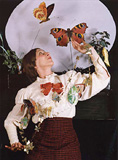
Butterfly Rover
|
We take the show to public spaces beside the rivers and lakes of the Broads. We now perform around 23 shows to about 2000 people over a 3-week tour. Our BA shows can be taken to other public events, such as county agricultural shows and environmental conferences. We also have taken the shows to local schools in deprived urban areas adjacent to the Broads, and to small theatres and community centres. These tours are funded independently and often subsidised by grants from charitable trusts or local councils, to enable better access to the arts by isolated rural communities.
The shows are aimed at people of all ages. The adults get all the jokes, learn about the Broads themselves, and rediscover their own childhoods watching the children’s response. Our recurring themes are: how we as human beings are to live in our environment; the damaging effect our population is having on the plants and animals we depend on for our survival; how to respect the needs of other species and not be greedy in our use of natural resources; and last but not least, the marvellous beauty and wonder of the natural world.
Rachael Miller comments:
"The National Parks are not well-funded, but supporting Nutmeg is a good use of the funds we have because each show does many things and works on many levels. Tourism is the basis of the local economy, and we are glad to have Nutmeg. They provide an economic support to the area. The BA can provide shows in different villages and public spaces, shows which people can see for free. The shows bring people into the Broads; they are part of why people come here. But there is also a strong local following for Nutmeg. People bring their children to see the shows, and have done for years. The shows do get to the adults and parents; they get drawn in when they bring their children."
Acts of faith
Children are great believers in justice and empathise with the young, the small and the oppressed. We try to encourage this and present the case for a fairer and more honest relationship between human beings and the rest of creation, through our characters and stories. We know, however, that there is no point in being didactic, reeling out strings of indigestible facts, or presenting one point-of-view as the irrefutable truth. Our shows are full of humour, scary moments, exciting rescues and silly diversions, but vital questions are presented, if not answered, and useful and interesting information slips in almost undetected behind the jokes.
Does our work make any difference? Possibly not at all, though I’d like to think that people leave our shows more aware and attuned to the natural world so they will treat it better. Like most education it’s an act of faith.
Nutmeg travels to the Danube Delta
Our most ambitious act of faith yet took place in the Danube Delta between 1995-99. I had gone to a European Nature-Park conference in Hungary in 1991, and it had opened up a wider world for me. The Iron Curtain had just fallen and environmentalists in the former Soviet Bloc countries were desperate for contact and help from the west.
Aitken Clark, the then Broads Authority Chief Executive, was involved in setting up the new International Biosphere Reserve in the Danube Delta, Romania, and had made good friends in the Danube Delta Biosphere Reserve Authority [DDBRA]. He was aware of the enormous problems facing them. He also knew of an under-used source of UK funding, the Environmental Know-How Fund, and was convinced that what the Delta needed was Nutmeg Puppet Company. I wasn’t so sure, but I like a challenge.
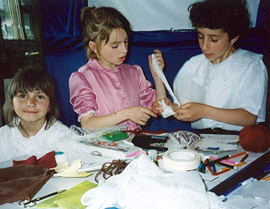
Eco-Puppets in the Danube Delta
|
The Danube has Europe's largest delta. All the world's red-breasted geese spend the winter here, and there are significant breeding colonies of pelicans and cormorants. Recently, the rise of environmentally destructive economic activities, such as dam-building, fish farming and industrial pollution, have led to a decline in species populations and in biodiversity, and a degradation of some habitats.
I was offered a small grant to go on a ‘scoping mission’. So off I went into the depths of the Romanian winter as a guest of the DDBRA to plan a possible project with them, local teachers and field-workers. It didn’t take long to realise that a show like the ones we do on the Broads was not going to be viable or appropriate. Communication and transport are difficult, at times non-existent, the geographical area is so much bigger and more remote, and the cultural differences are huge. We needed something that could involve children in the most isolated villages. In the end, we created a project for children in which they made their own shadow-puppets. These shows opened the eyes and ears of the children to their remarkable environment. The method was different but the intention the same.
We held a three-day puppetry conference in Romania organised for teachers and puppeteers, so that they could experience the whole process of developing a puppet show out of an environmental issue. They worked through all the stages of creating a story, making the puppets and sets, writing the script, devising music and finally performing to an audience. Enthusiasm for the approach was very evident. Many of the teachers in the Delta now run environmental puppetry clubs or use the techniques in their teaching. Many groups of children have written and performed shows. At one school, on the southern branch of the River Danube, biology and geography teachers help the children collect scientific material for the shows. Almost all the teachers in this school have been inspired and are incorporating environmental education into their teaching.
We produced a book with our Romanian colleagues, about the project, the Eco-Puppets Handbook, in Romanian and English. It is also a practical guide to all the aspects of making a show. The project still continues today thanks to a gifted local primary school teacher, Nina Sirotencu Mihalcea, and a network of her colleagues and environmentalists. To our delight, they have taken up our ideas and developed them in their own new, imaginative and exciting ways.
© Meg Amsden, edited and reprinted with permission.
published in 2004
|
"Does our work make any difference?
Possibly not at all, though I’d like to think that people leave our shows more aware and attuned to the natural world so they will treat it better.
Like most education it’s an act of faith." Meg Amsden
"The Broads Authority needs to find ways forward through the conflicting interests of conservation and preservation of the environment and the need to promote tourism. Meg’s shows help us with this in many ways. We’re lucky to have Nutmeg here." Rachael Miller, Events Ranger for the Broads Authority
|